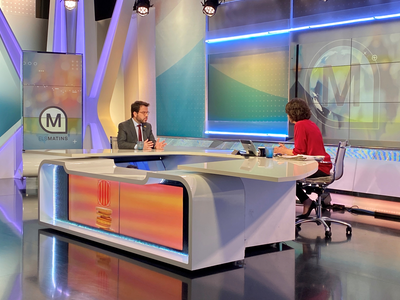- The vice-president said that if any group takes the budget to the Council for Statutory Guarantees, the only point will be to obstruct and delay its passage

Vice-President and Minister of Economy and Finance Pere Aragonès said today that the negotiating table between the Catalan and Spanish governments is “an opportunity we’ve never had before. We need to make the most of it and bring all our strength to the table so we can make progress towards the democratic solution that we’re advocating: amnesty and a self-determination referendum”. In an interview on the programme Els Matins de TV3, Aragonès confirmed that the planned meeting will take place before the end of February.
The vice-president said it was important for the negotiating table to meet and get under way because, “despite justified scepticism and wariness”, this is the first time that circumstances have compelled a Spanish government to sit down at a negotiating table “to talk, not about the financing system or the Statute of Autonomy, but about how we can put an end to repression and how we can consult our citizens on Catalonia’s future”.
With parliamentary debate on the Catalan government’s budget for 2020 set to begin tomorrow, the vice-president said that if any group takes the accounts to the Council for Statutory Guarantees, the only point will be to obstruct and delay the passage of the budget. According to Aragonès, it would be “extremely reckless” not to take advantage of the opportunity to pass the budget “now that we’ve ensured that we have the parliamentary majority we need”.
The economy minister said the budget was “good for citizens”, noting that the accounts envisage a €3 billion increase in spending over the 2017 budget, €2 billion in new investment, a 30% reduction in university fees, and the restoration of funding for nurseries, among other measures.
In response to criticism from some sectors that the package of tax measures included in the new budget disincentivises economic activity, Aragonès said: “What really disincentivises economic activity is the persistence of a fiscal deficit and the lack of infrastructure that this budget will allow us to deliver, such as the fibre-optic network.”